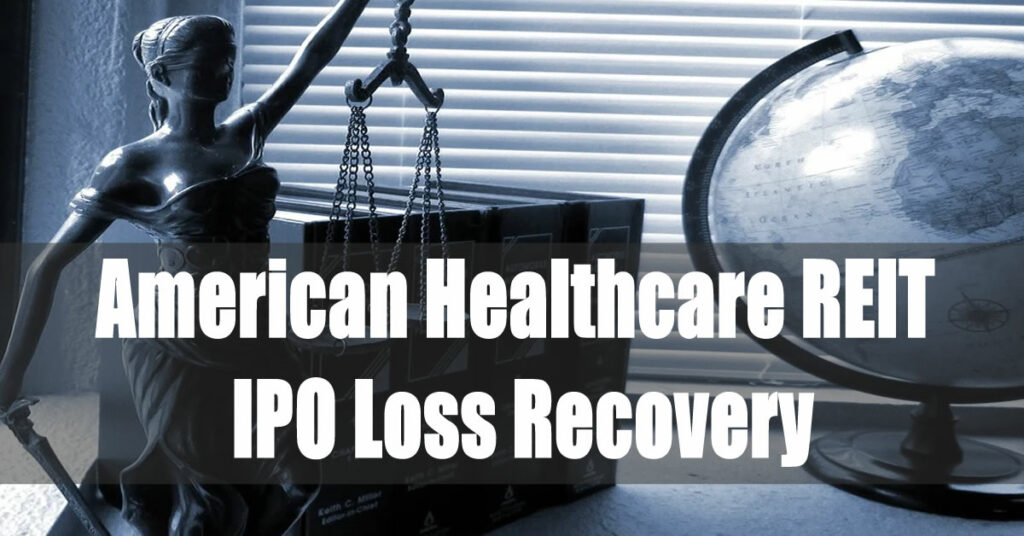Real estate investment can be complex, especially when new investment options hit the market. American Healthcare REIT Inc. (NYSE: AHR) made waves with their IPO, but shares sold at the lower end of expectations. BofA Securities served as one of the lead book-running managers for the IPO, highlighting their significant role in the process. Additionally, the equity syndicate involved in managing the IPO included KeyBanc Capital Markets and Citigroup, showcasing their critical involvement in the offering.
Investors in American Healthcare REIT Inc., previously known as Griffin-American Healthcare REIT, are invited to reach out to Haselkorn & Thibaut for a complimentary consultation. By calling 1-800-856-3352, they can explore options for recovering losses.
Our blog breaks down this event into bite-sized facts and explores what it could mean for your wallet following the declaration of effectiveness of the registration statement with the SEC and the completion and launch of the public offering. Stick around – there’s lots to unpack!
American Healthcare REIT Inc. IPO Details
Table of Contents
Diving deep into the American Healthcare REIT Inc. IPO, we unveil the numbers that sparked Wall Street’s attention, from its conservative pricing strategy to a comprehensive view of its extensive healthcare portfolio. The company intends to use the net proceeds received from the offering to repay outstanding credit facility amounts, showcasing a strategic move to strengthen its financial standing.
With all eyes on this major market move, we decode what it means for the REIT’s structure and how it positions itself amid competitive tender offers. Fifth Third Securities, alongside BofA Securities and the equity syndicate, acted as co-managers for the public offering, highlighting their crucial role in the successful execution of this financial endeavor.
IPO pricing and proceeds
American Healthcare REIT Inc. hit the market with a splash, albeit at the shallow end of their expectations. They managed to offload 56 million shares, each tagged at $12, right at the bottom of their anticipated range.
Even though they didn’t reach the $15 per share, this strategic move still filled their coffers with an impressive $672 million.
Investors watched closely as American Healthcare REIT’s value soared to an impressive $1.5 billion market capitalization post-IPO. Its listed outstanding shares reflected this significant boost, marking a substantial milestone for the company on NYSE: AHR’s ledgers.
Such a financial infusion positions them firmly for future endeavors within the healthcare real estate sector.
Griffin-American Healthcare REIT Merged To American Healthcare REIT
Griffin-American Healthcare REIT III and Griffin-American Healthcare REIT IV underwent a significant transformation. They merged on October 1, 2021, to create American Healthcare REIT. This merger was a strategic move to consolidate their strengths and position the new entity, American Healthcare REIT, as a major global player in the healthcare-focused real estate investment trust (REIT) market.
American Healthcare REIT owns and operates a diversified portfolio of clinical healthcare real estate properties, including medical office buildings, skilled nursing facilities, senior housing communities, and integrated senior health campuses. The combined assets of the merged entities total approximately $4.3 billion in gross investment value. This diversified portfolio is spread across 36 U.S. and United Kingdom states, encompassing 18.9 million square feet in 298 buildings, highlighting the significance of integrated senior health campuses within this extensive asset base.
The merger and the subsequent formation of American Healthcare REIT were critical steps toward a future public listing or IPO on a national stock exchange. This move aims to provide greater access to capital, broaden the investor base, and offer liquidity to shareholders.
This strategic merger and the focus on a potential public listing reflect the company’s adaptation to the growing and evolving healthcare market, driven by demographic trends and the increasing demand for healthcare services.
Market value and portfolio details
With a market value standing at around $1.5 billion, American Healthcare REIT Inc. positions itself firmly in the healthcare investment landscape. This valuation comes after consideration of all the outstanding shares filed with the U.S Securities and Exchange Commission.
The company’s robust portfolio stretches across various states, showcasing an impressive collection of medical office buildings, senior housing units, senior health campuses, skilled nursing facilities, hospitals, and other healthcare-related facilities.
Valued at about $4.6 billion as of September 30th, these assets form a diversified backbone for the REIT’s operations post-merger between Griffin-American Healthcare REIT III and IV along with American Healthcare Investors.
The real estate investment trust doesn’t just flaunt quantity but quality too; their investments cater to vital segments within America’s burgeoning healthcare sector. Moving on from what underscores its current market stance leads us to how it has navigated recent acquisition attempts – specifically responding to Comrit Investments’ tender offer.
Formation and response to third-party tender offer
American Healthcare REIT Inc. faced a challenging situation when Comrit Investments targeted its shares with a tender offer. Comrit sought to acquire up to 228,136 Griffin-American Healthcare REIT IV shares at $5 per share—a significant 58% discount compared to the REIT’s estimated net asset value (NAV) per share.
The board took a neutral stance on this offer, neither endorsing nor rejecting it outright. They highlighted several uncertainties about future liquidity events that shareholders needed to consider while deciding on the tender offer.
The company made its position known on January 11, 2024, leaving investors to consider their options regarding the bid from Comrit. This event signaled an essential juncture for American Healthcare REIT as it navigated through post-IPO waters and investor relations.
Shareholders were left to weigh their investment strategies moving forward into other aspects, such as potential implications for those invested in non-traded REITs
Implications of IPO on Investors
-
Implications of IPO on Investors: The debut of American Healthcare REIT Inc.’s IPO brings significant changes for investors, shaking up the status quo with a ripple effect that could alter investment returns and redefine shareholder experience. KeyBanc Capital Markets, RBC Capital Markets, and Regions Securities LLC are among the financial institutions involved in this IPO, highlighting the robust support from leading market players. It’s crucial for investors to understand the importance of complying with securities laws and the Securities Exchange Act of 1934 in the context of this IPO, as these regulations have significant implications for the investment landscape. Additionally, the latest financial reporting or portfolio valuation available to investors is as of September 30, providing a clear snapshot of the company’s current standing.
Potential implications for non-traded real estate investment trust investors
Investors holding non-traded shares in the Griffin American Healthcare REIT might soon enjoy increased liquidity. This directly affects the company’s potential listing on the NYSE, allowing easier buying and selling of shares compared to their previous status.
Plus, these investors are set to gain better insights into their investments’ worth through more transparent price discovery mechanisms that come with public trading.
Due to this anticipated public offering, adjustments could be on the horizon for dividends received by non-traded REIT investors. Alongside this, they must brace for impacts like halted share repurchase plans, which provided an exit strategy previously.
Market valuation fluctuations could also sway dividend amounts, especially in light of recent inflation surges and climbing interest rates affecting overall investment stability within the real estate sector.
Impact on income and dividends
The move to list American Healthcare REIT Inc. on the New York Stock Exchange brings about a crucial change for shareholders. With market fluctuations and real estate values in play, dividends could see an adjustment to reflect the new trading environment.
The initial public offering (IPO) might alter dividend policies as the company seeks a balance between growth and investor returns.
Shareholders should brace for potential shifts in their income streams from dividends, especially noting that high inflation and climbing interest rates have already pressured asset values.
As real estate markets adapt to these tough conditions, American Healthcare REIT may recalibrate payouts to maintain financial health and attract stock market investors.
Trading restrictions and lock-up periods
American Healthcare REIT Inc. investors often face trading restrictions and lock-up periods, especially around the IPO phase. These measures temporarily halt selling shares for a certain timeframe after the company goes public.
This means if you own stock in American Healthcare REIT, there could be a period where you can’t sell your shares, regardless of how the market moves.
In November 2022, for instance, the company suspended its share repurchase plan. This action directly affects investors’ ability to liquidate their holdings during that time. Shareholders must stay informed about such periods so they don’t find themselves unable to make critical investment decisions when needed.
Potential Securities Fraud Claims
The White Law Group is probing potential securities fraud claims linked to the American Healthcare REIT Inc. IPO, scrutinizing whether investors were inadequately informed of the risks involved—discover more about investor rights and legal recourse in our full coverage.
Investigation by Haselkorn & Thibaut
Lawyers at Haselkorn & Thiabut (InvestmentFraudLawyers.com) are actively probing potential securities fraud linked to American Healthcare REIT Inc. They’re digging into whether brokers might have wrongly suggested this investment, lured by hefty commissions.
This scrutiny comes when investors face substantial losses due to the limited ability to sell these non-traded REITs.
The firm’s investigation also focuses on whether broker-dealers did their homework before recommending American Healthcare REIT to clients. Financial advisors must ensure such investments are suitable for each investor, considering their risk tolerance and financial objectives, a step that may have been overlooked in some cases with this particular REIT.
Risks of non-traded REITs
Non-traded REITs come with complex challenges and high risks, often catching investors off guard. Liquidity is a major concern since these types of investments are not easily sold on the public market.
This can trap an investor’s money for longer than expected, leaving them without access to their funds when needed.
High sales commissions also skew the picture, as brokers might push non-traded REITs harder to earn up to 15% in fees. Unfortunately, this incentive can lead to situations where the investment isn’t aligned with the investor’s needs or risk tolerance.
Without adequate broker due diligence or proper suitability assessment, investors face potentially significant losses that could have been avoided with more transparent advice and better-aligned investment strategies.
Broker-dealer due diligence and suitability of recommendations
Understanding the high-risk nature of non-traded REITs highlights the critical role of broker-dealers in investor protection. These financial professionals must conduct thorough research and analysis to ensure that any real estate investment trust they recommend aligns with an investor’s profile, including their risk tolerance and investment objectives.
This process, known as due diligence, is not just a best practice; it’s a regulatory requirement.
Responsibility for making suitable recommendations doesn’t end there. When suggesting products like American Healthcare REIT Inc.’s offerings, broker-dealers must also consider an investor’s financial situation, age, and other investments.
With potentially high commissions at stake for brokers who sell these REITs, vigilance against conflicts of interest is paramount to safeguard investors from unsuitable choices that may harm their financial health.
American Healthcare REIT’s initial public offering marked a significant event in the investment world despite launching at the low end of expectations. Careful consideration is now paramount for investors as they navigate the changes in market value and dividend adjustments.
Haselkorn & Thibaut continues its diligent investigation into this IPO’s dealings, focusing particularly on broker-dealer conduct. For those holding shares or contemplating investment moves, staying abreast of developments will be crucial during this evolving situation.


